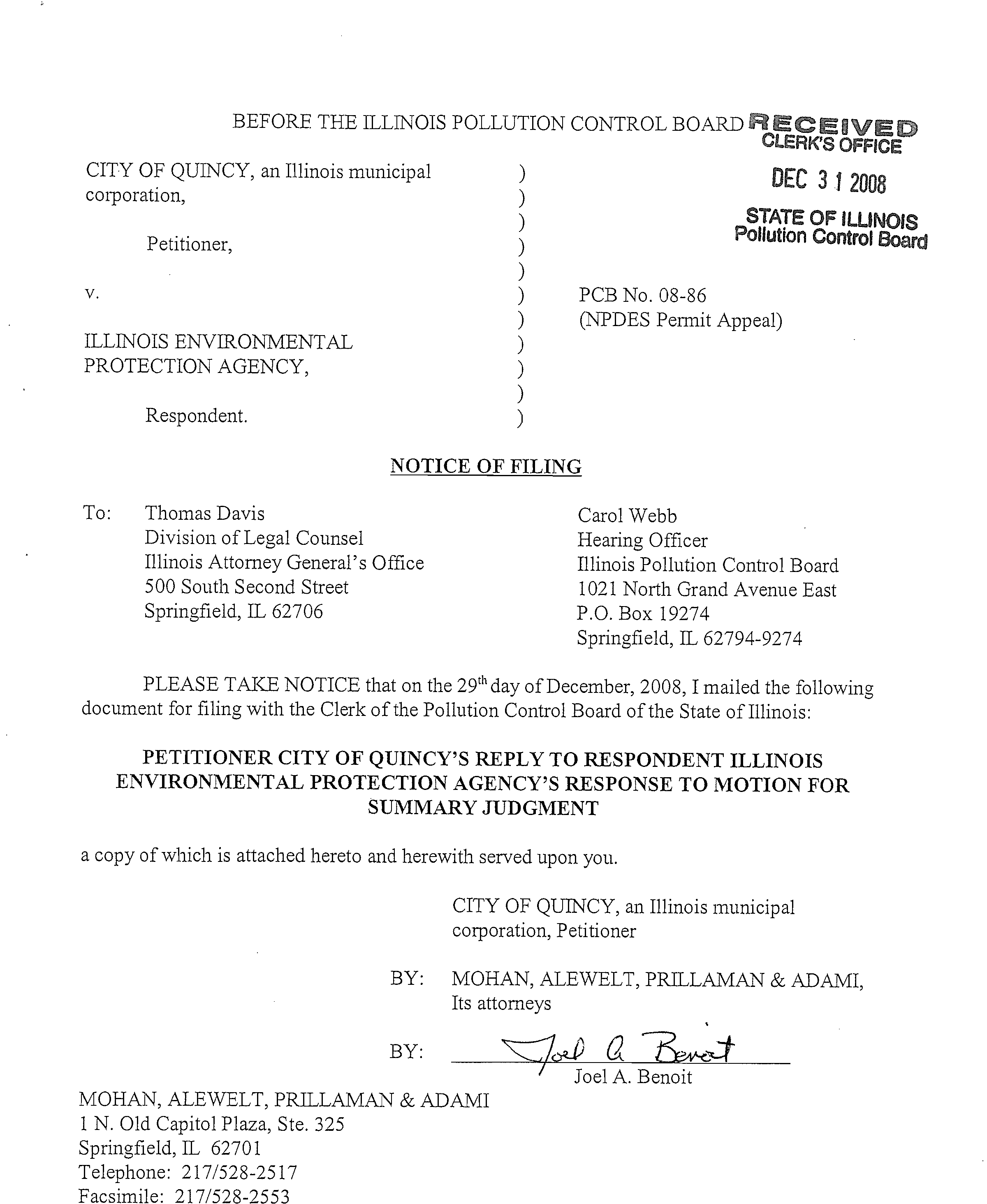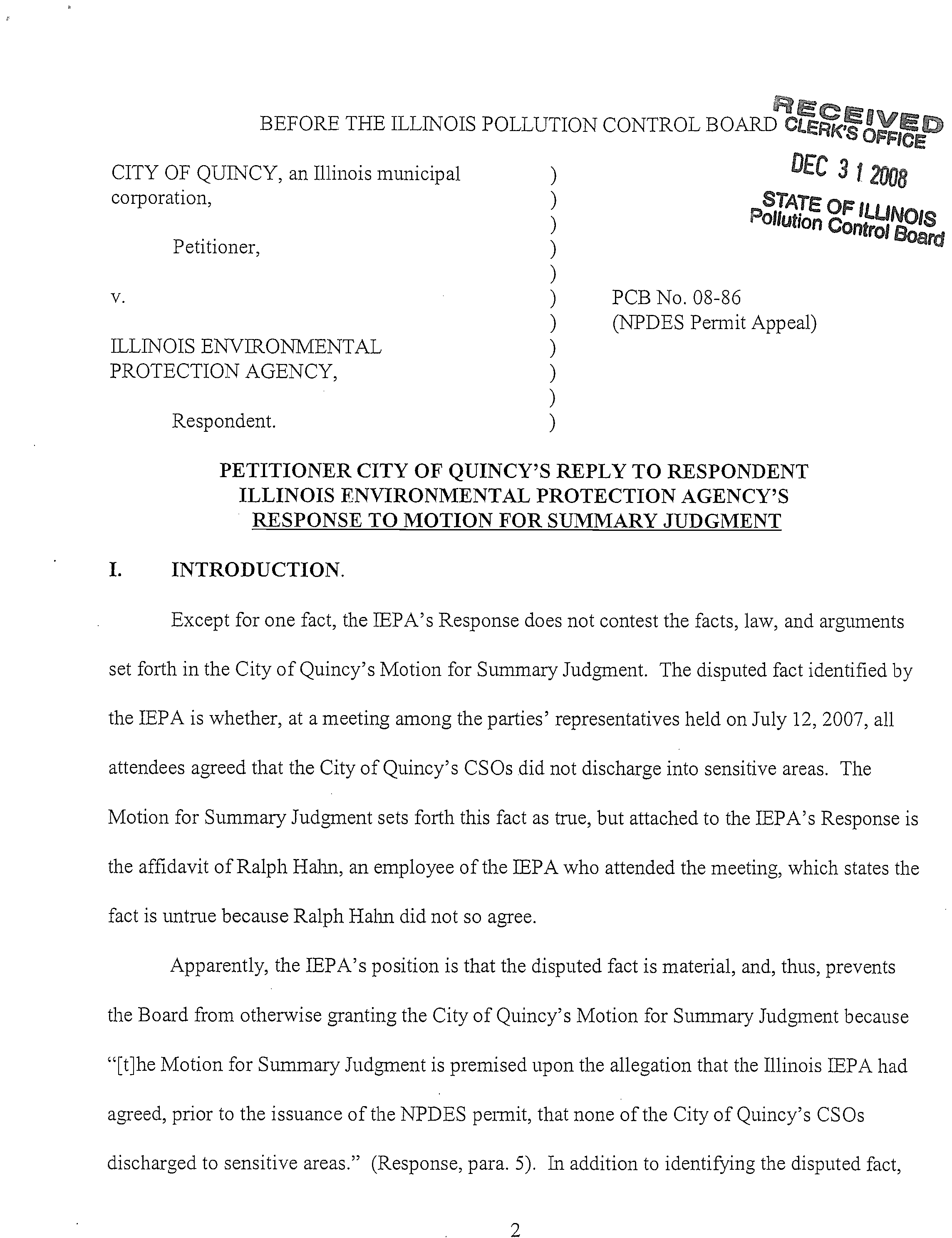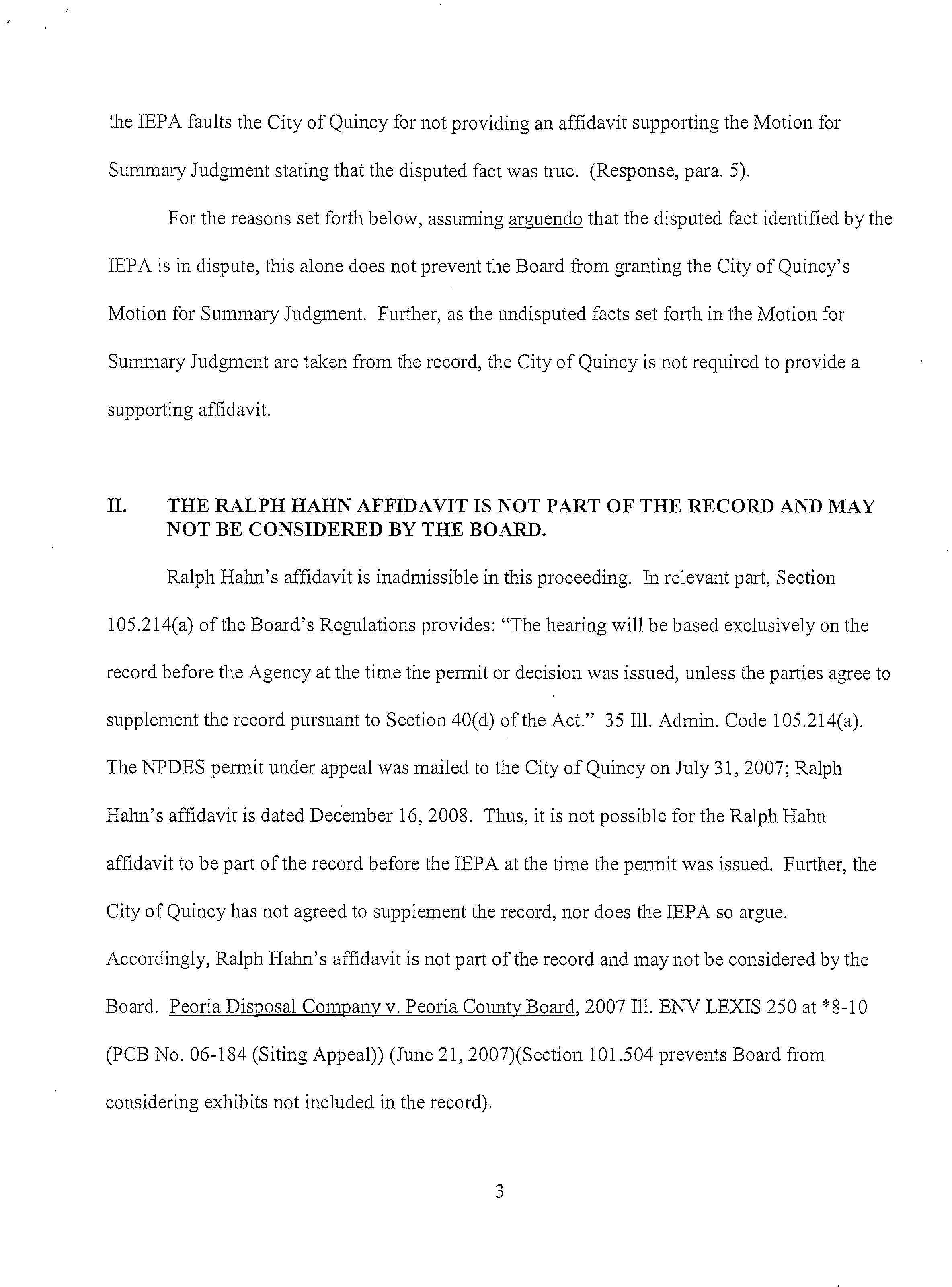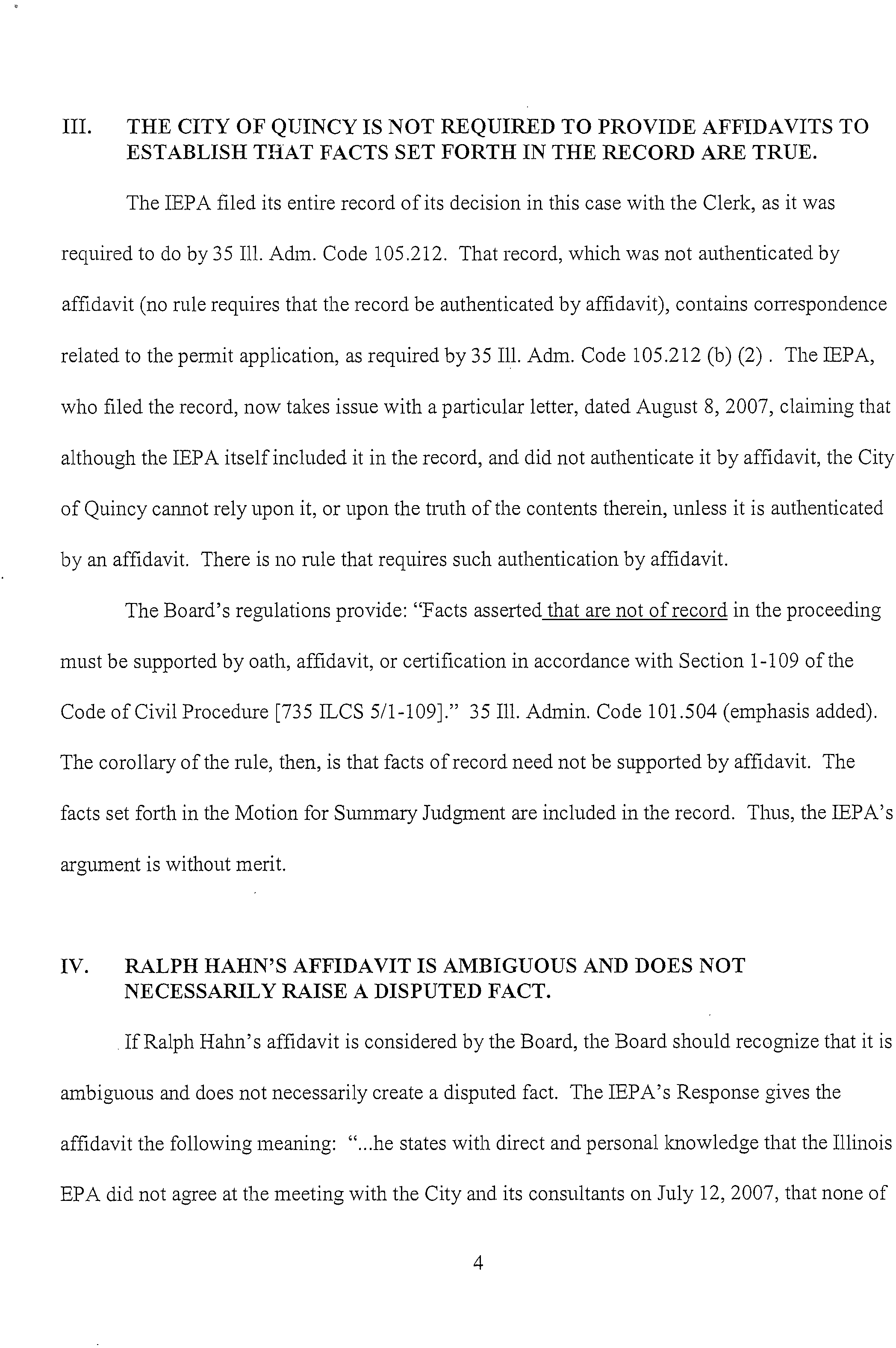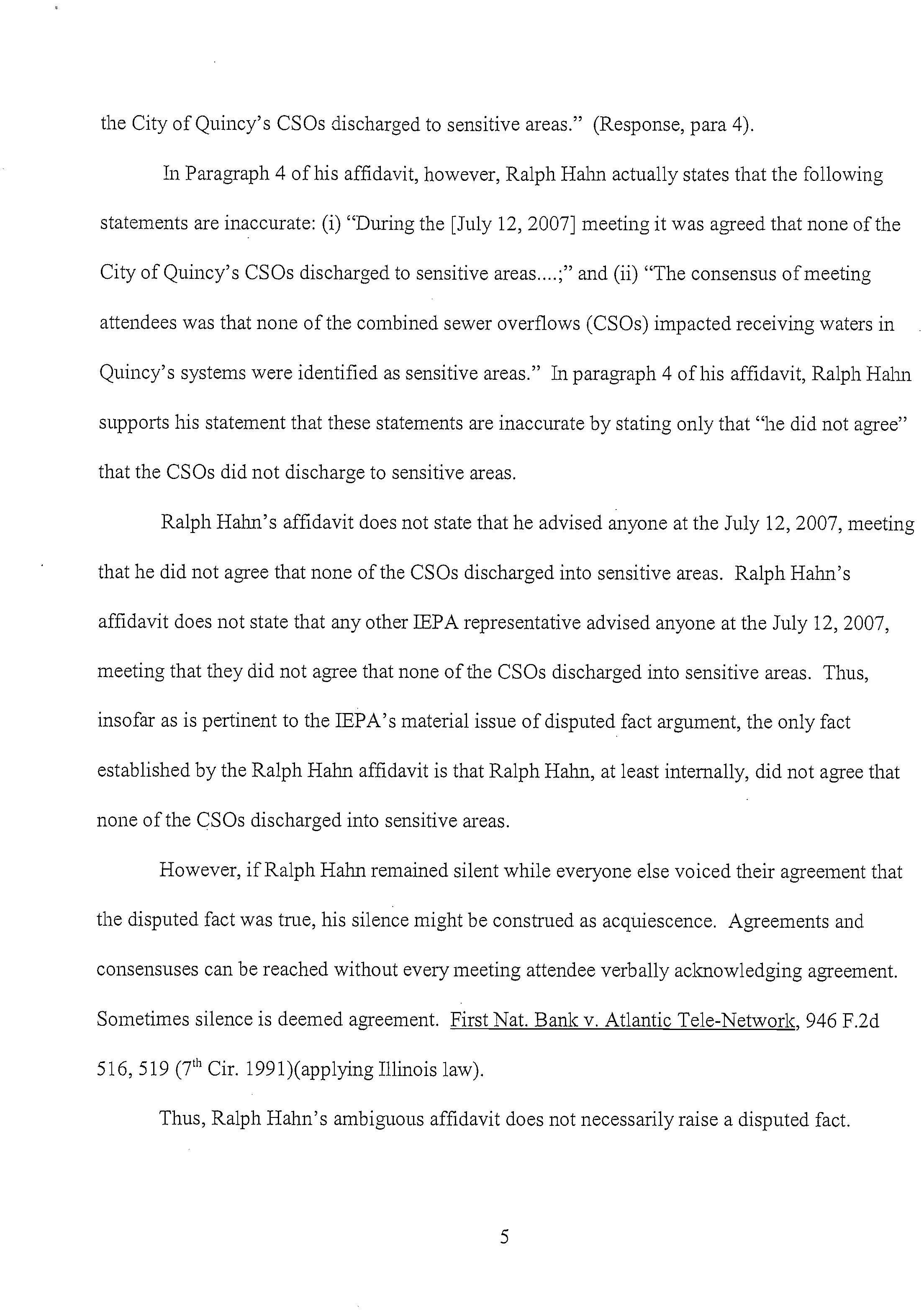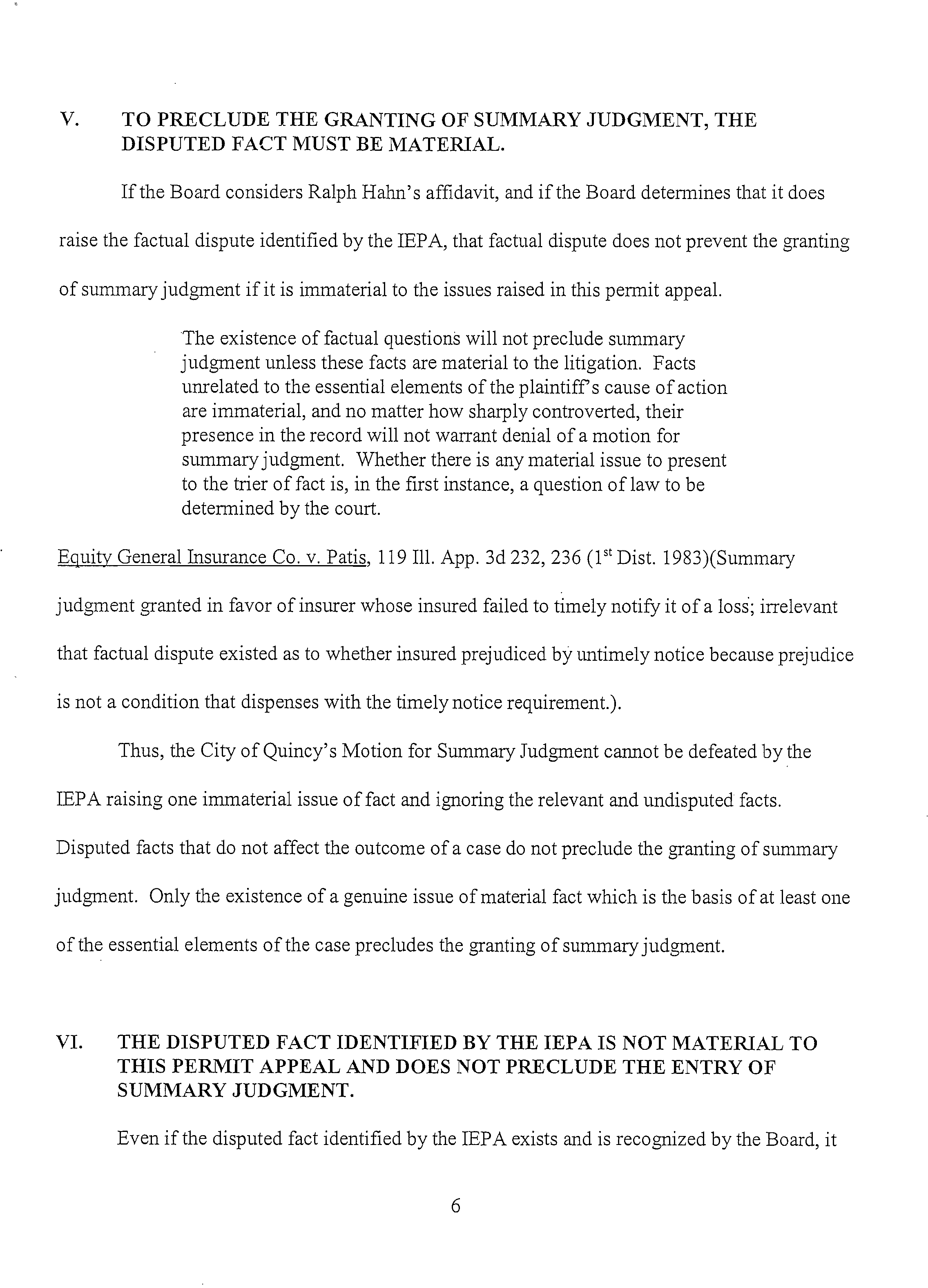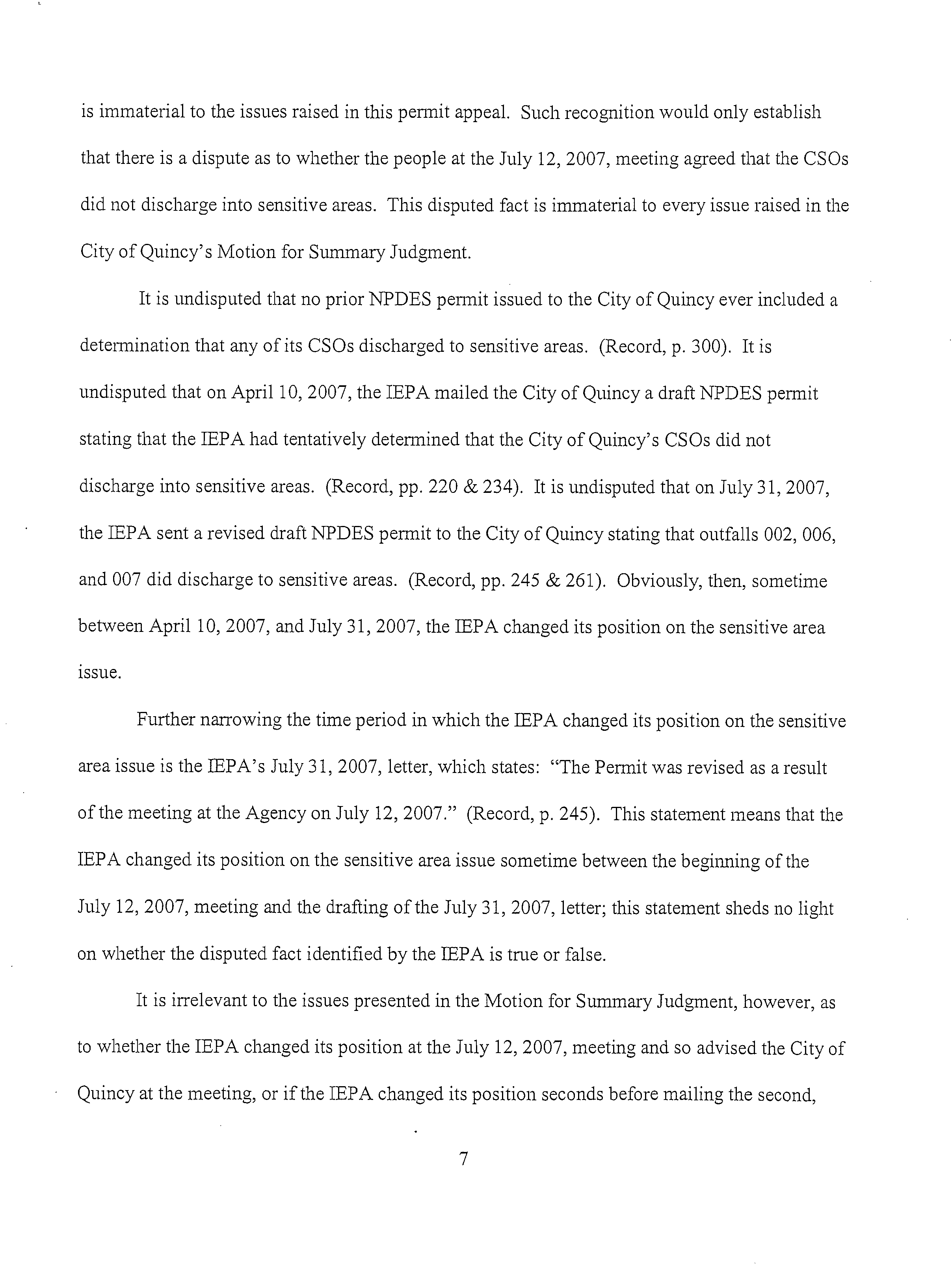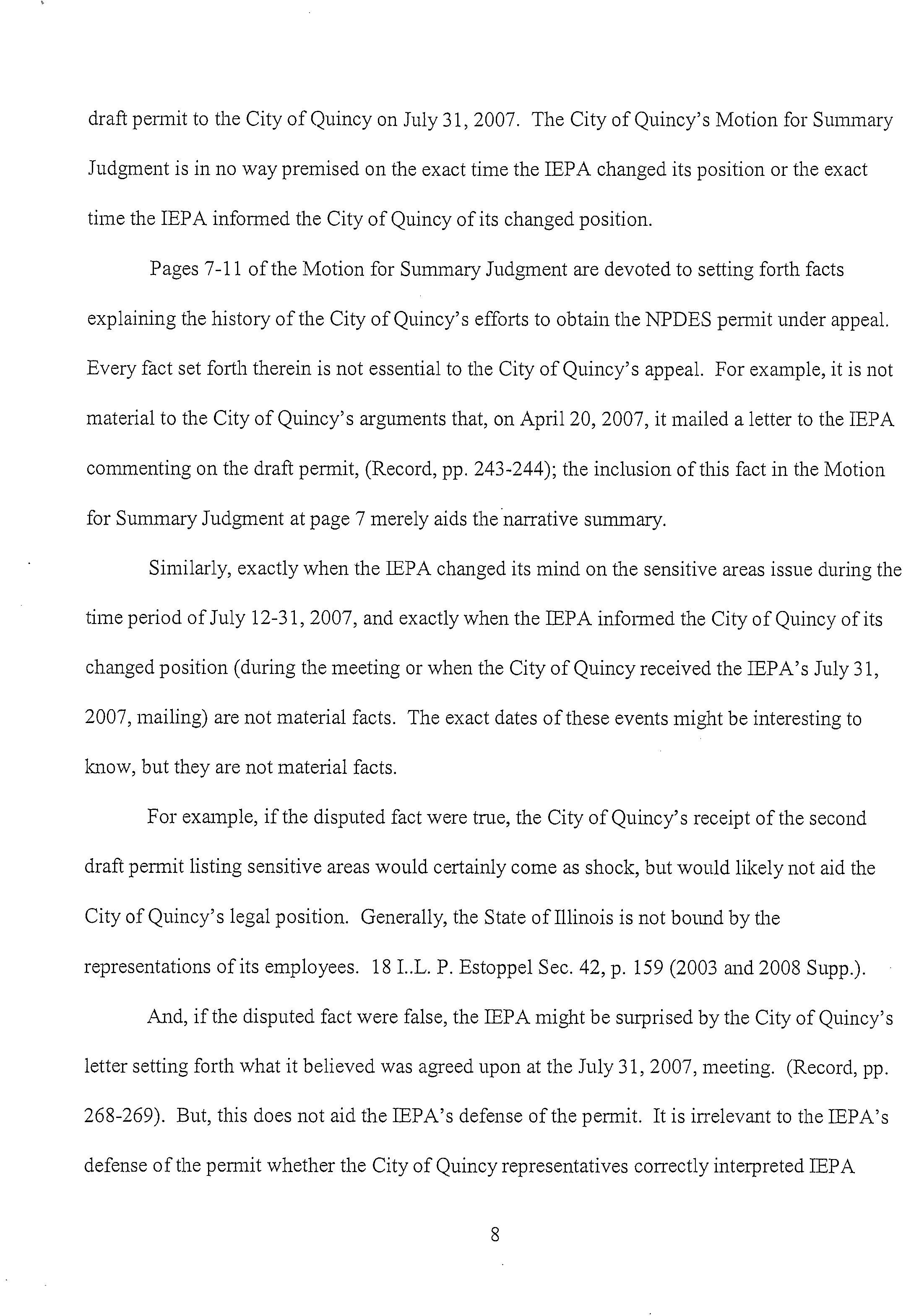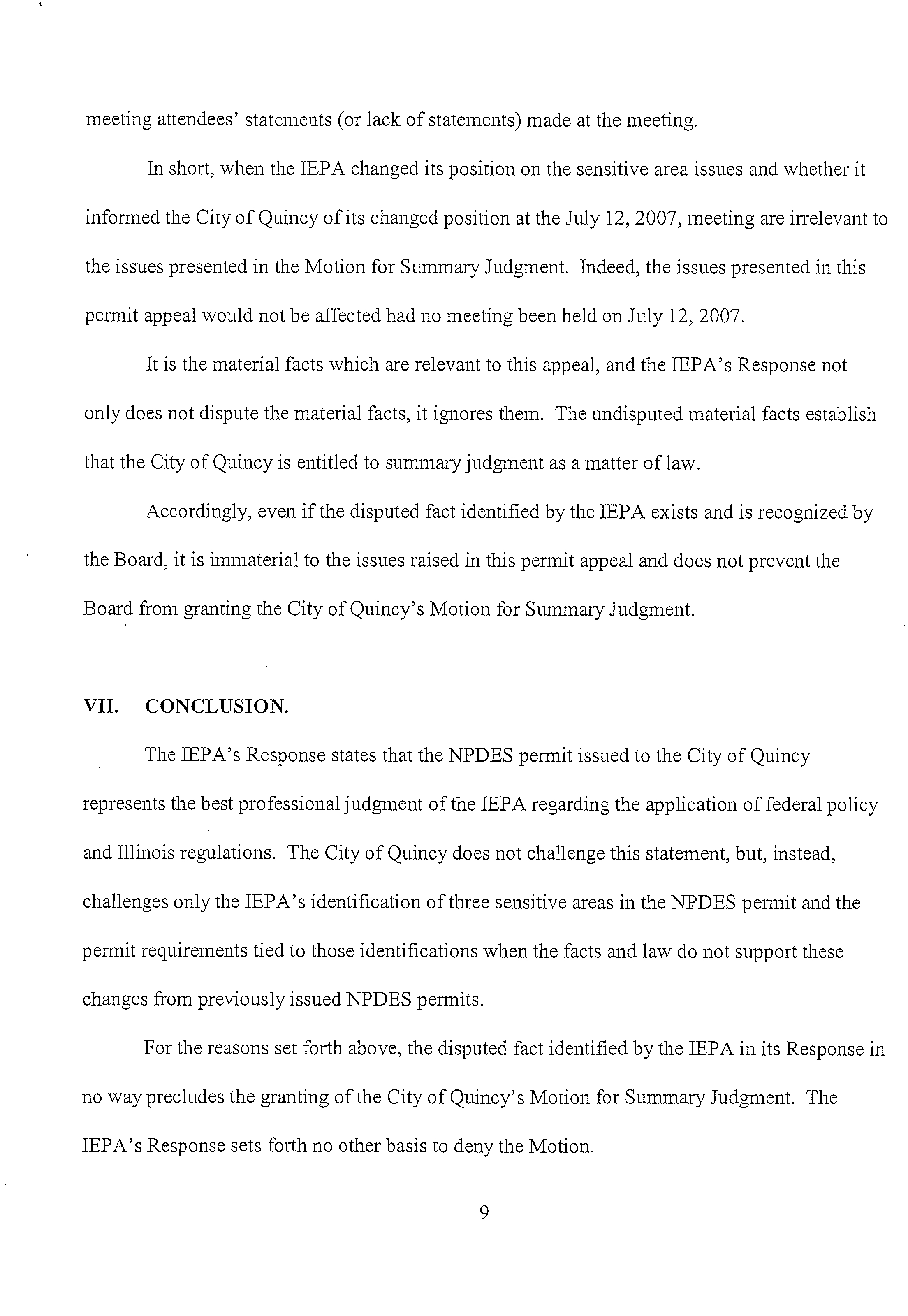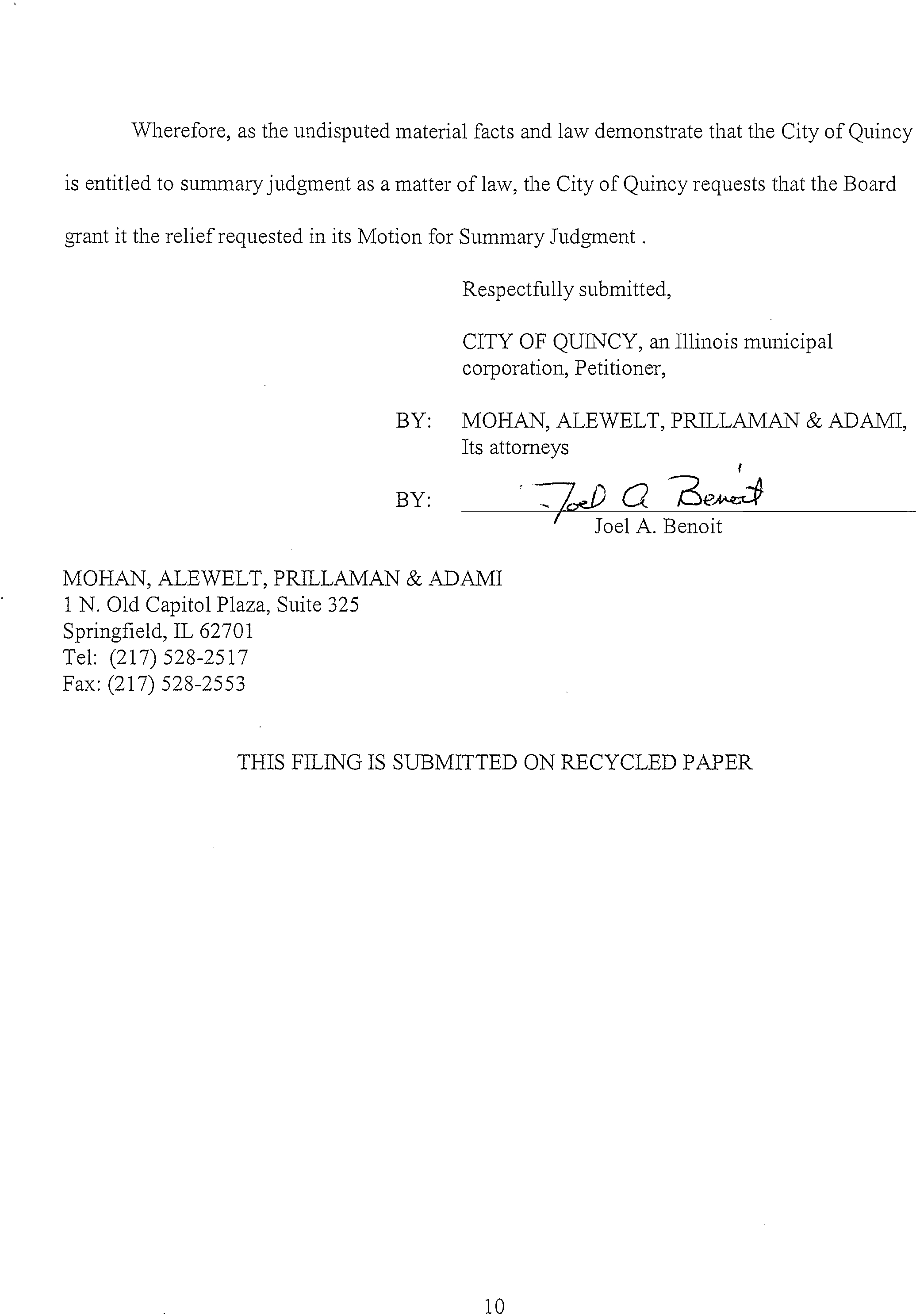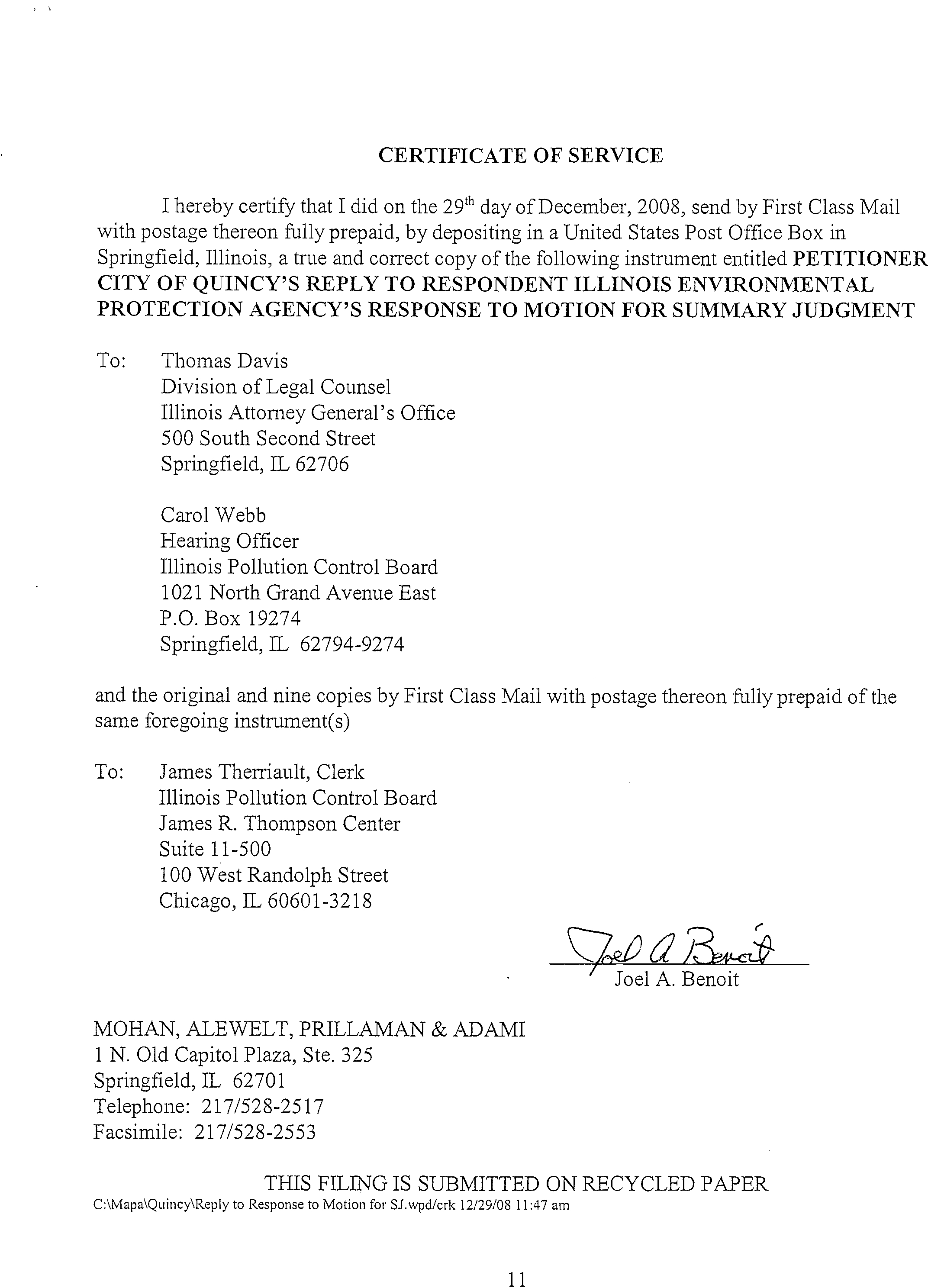BEFORE
THE
ILLINOIS
POLLUTION
CONTROL
BOARD
RECEVED
CLERK’S
OFFICE
corporation
CITY
OF
QUINCY, an
Illinois
municipal
))
DEC
312008
)
STATE
OF
ILLiNOIS
Petitioner,
)
Pollution
Control
Board
)
v.
)
PCBNo.
08-86
)
(NPDES
Permit
Appeal)
ILLINOIS ENVIRONMENTAL
)
PROTECTION
AGENCY,
)
)
Respondent.
)
NOTICE
OF
FILING
To:
Thomas
Davis
Carol
Webb
Division
of
Legal
Counsel
Hearing
Officer
Illinois
Attorney
General’s
Office
Illinois
Pollution
Control
Board
500
South
Second
Street
1021
North
Grand Avenue
East
Springfield,
IL 62706
P.O.
Box
19274
Springfield,
IL
62794-9274
PLEASE
TAKE
NOTICE that
on
the
29
th
day
of
December,
2008,
I
mailed
the
following
document
for
filing
with
the
Clerk
of
the
Pollution
Control
Board
of
the
State
of Illinois:
PETITIONER
CITY
OF
QUINCY’S
REPLY
TO
RESPONDENT
ILLINOIS
ENVIRONMENTAL
PROTECTION
AGENCY’S
RESPONSE
TO
MOTION
FOR
SUMMARY
JUDGMENT
a
copy
of
which
is
attached
hereto
and herewith
served
upon
you.
CITY
OF
QUINCY,
an Illinois
municipal
corporation,
Petitioner
BY:
MOHAN,
ALE
WELT,
PRILLAMAN
&
ADAMI,
Its
attorneys
BY:
/
Joel
A.
Benoit
MOHAN,
ALE
WELT,
PRILLAMAN
&
ADAMI
1
N.
Old
Capitol
Plaza,
Ste.
325
Springfield,
IL
62701
Telephone:
217/528-2517
Facsimile:
217/528-2553
BEFORE THE
ILLINOIS
POLLUTION
CONTROL
BOARD
CITY
OF
QUINCY,
an
Illinois
municipal
)
DEC
72008
corporation,
)
FO1lUj
STATE
p
0
r
‘
I %‘OflfrO
BOarj
Petitioner,
)
)
v.
)
PCB
No. 08-86
)
(NPDES
Pennit
Appeal)
ILLINOIS
ENVIRONMENTAL
)
PROTECTION
AGENCY,
)
)
Respondent.
)
PETITIONER
CITY
OF
QUINCY’S
REPLY
TO
RESPONDENT
ILLINOIS
ENVIRONMENTAL
PROTECTION
AGENCY’S
RESPONSE
TO
MOTION
FOR SUMMARY
JUDGMENT
I.
INTRODUCTION.
Except
for
one fact,
the
IEPA’s
Response
does
not contest
the
facts, law,
and
arguments
set
forth
in
the City
of
Quincy’s
Motion for
Summary
Judgment.
The
disputed
fact identified
by
the
JEPA
is
whether, at
a meeting
among
the
parties’
representatives
held
on July 12,
2007, all
attendees
agreed
that
the
City of
Quincy’s CSOs
did not
discharge
into sensitive
areas.
The
Motion
for Summary
Judgment
sets forth
this fact
as true, but
attached
to
the IEPA’s
Response
is
the affidavit
of Ralph
Hahn,
an
employee
of
the JEPA
who attended
the
meeting,
which
states
the
fact
is
untrue
because
Ralph
Hahn
did not so
agree.
Apparently,
the
IEPA’s position
is
that
the disputed
fact
is
material, and,
thus,
prevents
the
Board
from
otherwise
granting
the City
of
Quincy’s
Motion
for
Summary
Judgment
because
“[t]he Motion
for
Summary
Judgment
is
premised
upon
the allegation
that
the
Illinois
PA
had
agreed,
prior to
the issuance
of the
NPDES
permit,
that
none
of the
City
of Quincy’s
CSOs
discharged
to
sensitive
areas.”
(Response,
para.
5). In addition
to
identifying
the
disputed
fact,
2
the JEPA faults
the
City
of
Quincy
for
not
providing
an
affidavit
supporting the Motion
for
Summary
Judgment
stating
that
the
disputed
fact was
true.
(Response,
para. 5).
For the
reasons
set forth
below, assuming arguendo
that the
disputed
fact
identified
by
the
JEPA
is in
dispute, this alone
does not
prevent
the
Board from granting
the City of
Quincy’s
Motion for Summary
Judgment. Further,
as the undisputed
facts set forth in
the
Motion for
Summary Judgment
are taken from
the
record,
the City
of Quincy is not required
to provide
a
supporting
affidavit.
II.
THE RALPH
HAHN
AFFIDAVIT
IS NOT
PART OF
THE RECORD AND
MAY
NOT
BE
CONSIDERED BY
THE BOARD.
Ralph
Hahn’s
affidavit
is inadmissible
in this
proceeding. In
relevant part, Section
105.2 14(a)
of the Board’s Regulations
provides:
“The hearing will
be
based exclusively
on the
record
before the Agency
at
the time the
permit
or decision
was issued, unless
the parties
agree to
supplement the record
pursuant
to
Section 40(d)
of
the
Act.” 35 Ill.
Admin. Code 105.214(a).
The
NPDES
permit under appeal
was
mailed to the
City
of Quincy
on July
31,
2007;
Ralph
Hahn’s affidavit
is
dated Dedember
16, 2008.
Thus, it is not possible
for the Ralph Hahn
affidavit
to
be part
of the record before
the JEPA at
the time the permit was
issued.
Further,
the
City of Quincy
has not agreed
to supplement
the record, nor
does the IEPA
so
argue.
Accordingly,
Ralph Hahn’s affidavit
is not
part
of the record
and may not be
considered
by
the
Board. Peoria Disposal
Companyv.
Peoria
County
Board, 2007 Ill. ENV
LEXIS 250
at
*8.1o
(PCB No.
06-184 (Siting
Appeal)) (June
21, 2007)(Section
101.504 prevents Board
from
considering
exhibits
not included
in
the
record).
3
III.
THE
CITY OF QIJINCY
IS
NOT
REQUIRED
TO PROVIDE AFFIDAVITS
TO
ESTABLISH THAT
FACTS
SET FORTH IN
THE RECORD ARE
TRUE.
The IEPA filed its entire
record of
its decision in this case with the Clerk, as
it was
required
to do by 35 Ill. Adm. Code 105.212. That
record, which was not
authenticated
by
affidavit
(no rule
requires that the record
be
authenticated
by
affidavit), contains conespondence
related
to the
permit application, as required
by 35
Ill. Adm. Code
105.212
(b)
(2)
. The IEPA,
who filed the record, now takes issue with a particular letter,
dated August 8, 2007, claiming that
although
the IEPA
itself included it in the record, and did not
authenticate
it
by
affidavit, the City
of Quincy cannot rely upon it, or upon the
truth
of
the contents therein, unless it is
authenticated
by
an affidavit. There is no rule
that requires such authentication by affidavit.
The
Board’s regulations provide: “Facts asserted
that are not
of
record
in
the proceeding
must be supported by
oath,
affidavit, or
certification
in
accordance with Section 1-109 of
the
Code
of
Civil Procedure [735 ILCS 5/1-109].” 35 Ill. Admin. Code
101.504 (emphasis
added).
The corollary
of
the nile, then, is that facts of record
need not be supported
by
affidavit.
The
facts
set
forth in
the Motion for Summary
Judgment
are
included
in
the
record. Thus,
the
IEPA’s
argument is
without merit.
IV.
RALPH HAHN’S
AFFIDAVIT
IS AMBIGUOUS
AND DOES NOT
NECESSARILY RAISE A DISPUTED FACT.
If Ralph Hahn’s affidavit is
considered
by
the Board, the Board should
recognize
that
it is
ambiguous and does not necessarily
create
a
disputed fact. The
IEPA’s Response gives the
affidavit the
following meaning: “. . .he states
with direct and personal
knowledge that the
Illinois
EPA
did
not agree at the meeting
with
the City and
its
consultants
on July
12, 2007,
that
none of
4
the
City
of
Quincy’s
CSOs
discharged
to sensitive
areas.”
(Response,
para 4).
In Paragraph 4
of his
affidavit,
however,
Ralph
Hahn
actually
states that the following
statements
are inaccurate:
(i)
“During
the [July
12, 2007] meeting
it was agreed that none
of the
City
of Quincy’s
CSOs
discharged
to sensitive
areas...;”
and (ii) “The consensus
of meeting
attendees
was
that none
of
the combined
sewer overflows
(CSOs) impacted
receiving waters
in
Quincy’s systems were
identified
as
sensitive areas.”
In paragraph
4
of his
affidavit,
Ralph
Hairn
supports
his statement
that these statements
are
inaccurate
by
stating
only that “he
did not agree”
that
the
CSOs did
not
discharge
to sensitive
areas.
Ralph
Hahn’s
affidavit does
not state that he
advised
anyone
at the
July
12,
2007,
meeting
that
he did
not
agree that
none
of
the
CSOs
discharged
into sensitive
areas. Ralph Hahn’s
affidavit
does not state
that any other
IEPA
representative
advised
anyone
at the July 12, 2007,
meeting that they
did
not agree
that
none of
the
CSOs discharged
into
sensitive areas.
Thus,
insofar as is
pertinent to
the
IEPA’s
material
issue
of
disputed fact argument,
the only
fact
established
by
the
Ralph
Hahn affidavit
is that Ralph
Hahn,
at least
internally,
did not agree that
none
of
the
CSOs
discharged
into sensitive
areas.
However,
if
Ralph Hahn
remained
silent
while
everyone
else
voiced
their
agreement
that
the disputed
fact was true,
his silence
might be construed
as
acquiescence.
Agreements
and
consensuses can be reached
without
every meeting
attendee
verbally
acknowledging
agreement.
Sometimes
silence
is
deemed agreement.
First
Nat.
Bank
v.
Atlantic
Tele-Network,
946 F.2d
516,
519
(
7
th
Cir. 1991)(applying
Illinois law).
Thus,
Ralph
Hahn’s
ambiguous
affidavit
does
not necessarily raise
a disputed fact.
5
V.
TO PRECLUDE
THE
GRANTING
OF
SUMMARY
JUDGMENT,
THE
DISPUTED
FACT MUST
BE MATERIAL.
If the Board
considers Ralph
Hahn’s affidavit, and
if the Board
detenriines
that
it does
raise the
factual dispute identified
by the IEPA,
that factual dispute
does
not
prevent the
granting
of summary
judgment if it is
immaterial
to
the issues raised in this
permit appeal.
•The
existence
of factual questions will
not preclude
summary
judgment
unless
these
facts are material
to
the
litigation.
Facts
unrelated
to the essential elements
of the plaintiff’s
cause
of action
are immaterial, and
no
matter how
sharply
controverted,
their
presence
in the record
will not warrant
denial of a motion
for
summary
judgment.
Whether there is any
material
issue
to present
to the
trier of fact is,
in
the
first instance,
a question
of
law to be
determined
by the court.
Equity General Insurance
Co.
v.
Patis,
119
Ill. App. 3d 232, 236
(1St
Dist. 1983)(Sumrnary
judgment
granted in favor
of
insurer whose
insured failed
to timely notify
it of a 1os;
irrelevant
that factual
dispute existed
as to whether
insured prejudiced
b3 untimely
notice
because
prejudice
is not a condition
that dispenses
with the timely
notice requirement.).
Thus, the City
of Quincy’s Motion
for Summary
Judgment cannot
be defeated
by the
IEPA
raising
one
immaterial
issue
of
fact
and ignoring the relevant
and undisputed
facts.
Disputed facts that do
not affect the
outcome
of
a
case
do not preclude
the granting
of summary
judgment.
Only
the existence
of a
genuine
issue of material fact
which
is
the
basis of at least
one
of
the
essential elements
of the case
precludes the granting
of
summary
judgment.
VI.
THE
DISPUTED
FACT IDENTIFIED
BY THE IEPA
IS NOT
MATERIAL
TO
THIS
PERMIT APPEAL
AND
DOES
NOT PRECLUDE
THE ENTRY
OF
SUMMARY
JUDGMENT.
Even
if
the disputed
fact identified
by the IEPA exists
and is recognized
by
the
Board,
it
6
is
immaterial to
the
issues raised
in this
permit
appeal.
Such
recognition
would
only establish
that
there is
a dispute
as to
whether the people
at
the
July 12, 2007,
meeting agreed
that the
CSOs
did
not discharge into
sensitive areas.
This disputed
fact is
immaterial
to
every
issue
raised
in the
City
of Quincy’
s Motion
for Summary
Judgment.
It is undisputed
that
no prior NPDES
permit issued
to the City of Quincy
ever included
a
determination
that
any of its CSOs discharged
to sensitive
areas.
(Record,
p.
300). It
is
undisputed
that
on April 10, 2007,
the IEPA mailed
the
City
of Quincy a draft
NPDES permit
stating that
the IEPA
had tentatively
determined
that
the City of Quincy’s
CSOs did
not
discharge
into
sensitive
areas. (Record,
pp.
220
&
234).
It is undisputed
that
on July
31, 2007,
the IEPA sent a revised
draft NPDES
permit
to the City
of Quincy stating that
outfalls 002,
006,
and
007 did
discharge
to
sensitive areas.
(Record,
pp.
245
& 261). Obviously,
then, sometime
between
April
10, 2007,
and July 31, 2007,
the IEPA
changed
its
position on the sensitive
area
issue.
Further
narrowing
the
time period
in which
the IEPA
changed
its position
on the sensitive
area
issue is the
IEPA’s July 31, 2007,
letter, which
states: “The
Permit was
revised as a
result
of
the
meeting at
the
Agency
on July 12, 2007.”
(Record,
p.
245).
This
statement
means that
the
IEPA
changed
its
position on the
sensitive area
issue sometime
between the beginning
of the
July
12, 2007, meeting and
the drafting
of the July
31, 2007, letter;
this statement
sheds
no
light
on whether the
disputed
fact
identified
by
the
IEPA
is
true
or false.
It
is irrelevant to
the issues presented
in the Motion
for Summary
Judgment,
however, as
to
whether
the IEPA changed
its position
at
the July 12,
2007, meeting and
so advised
the City
of
Quincy
at the
meeting, or
if the IEPA changed its
position seconds
before
mailing
the
second,
7
draft
permit
to
the
City
of Quincy
on
July
31,
2007.
The
City of Quincy’s
Motion
for Summary
Judgment
is in no
way
premised
on
the exact
time
the IEPA
changed its
position
or
the
exact
time the JEPA
informed
the City
of Quincy
of
its changed
position.
Pages
7-11
of the Motion
for Summary
Judgment
are
devoted
to
setting forth
facts
explaining
the history
of the
City
of Quincy’s
efforts
to obtain
the NPDES
permit under
appeal.
Every
fact set
forth
therein
is not essential
to the
City of
Quincy’s appeal.
For
example, it
is
not
material
to the City
of Quincy’s
arguments
that, on
April 20,
2007,
it
mailed
a letter
to the IEPA
commenting
on
the draft
permit,
(Record,
pp.
243-244);
the inclusion
of
this
fact in the
Motion
for
Summary
Judgment
at
page
7
merely aids
the
narrative
summary.
Similarly,
exactly
when
the IEPA
changed
its
mind
on the
sensitive
areas issue
during
the
time
period
of July
12-31,
2007,
and exactly
when
the
IEPA
informed
the City
of Quincy
of its
changed
position
(during the
meeting
or when
the City
of Quincy
received the
1EPA’s
July
31,
2007, mailing)
are not
material
facts.
The
exact dates
of these
events
might be interesting
to
know,
but they
are
not
material
facts.
For
example, if
the
disputed
fact
were
true,
the City of
Quincy’
s
receipt
of
the second
draft
permit listing
sensitive
areas would
certainly
come
as
shock,
but
would
likely not
aid the
City
of Quincy’s
legal
position.
Generally,
the State
of Illinois
is
not
bound
by
the
representations
of its
employees.
18 I..L.
P.
Estoppel
Sec. 42,
p.
159
(2003
and 2008
Supp.).
And,
if
the
disputed fact
were
false, the
IEPA
might
be surprised
by the
City of Quincy’s
letter
setting
forth
what
it believed
was
agreed
upon
at the
July 31, 2007,
meeting.
(Record,
pp.
268-269).
But,
this
does
not aid the
IEPA’s
defense
of the
permit.
It is
irrelevant
to the
IEPA’s
defense
of the
pemlit
whether
the City
of
Quincy representatives
correctly
interpreted
TEPA
8
meeting attendees’
statements (or
lack
of statements)
made
at the meeting.
In
short,
when
the IEPA
changed
its position
on the sensitive
area issues and whether
it
informed
the
City of
Quincy of its changed
position at the
July 12, 2007, meeting
are
irrelevant
to
the
issues
presented in the Motion
for Summary
Judgment. Indeed,
the
issues
presented
in this
permit
appeal would
not be affected had
no meeting been
held on July 12,
2007.
It is the
material facts which
are relevant
to
this
appeal,
and the IEPA’s Response
not
only
does not dispute
the
material
facts, it ignores
them. The undisputed
material
facts
establish
that the
City
of Quincy
is entitled to
summary judgment
as
a matter of
law.
Accordingly,
even if the
disputed
fact
identified
by
the IRPA
exists and
is recognized
by
the Board,
it is immaterial
to
the issues
raised in this
permit appeal and does
not prevent
the
Board
from
granting the City
of
Quincy’s
Motion
for Summary
Judgment.
VII.
CONCLUSION.
The IEPA’s
Response
states that the
NPDES permit
issued to the
City of Quincy
represents
the best
professional
judgment
of the IEPA regarding
the
application
of federal
policy
and
Illinois
regulations. The
City of Quincy
does not challenge
this
statement,
but, instead,
challenges only the
IEPA’s identification
of
three sensitive
areas
in
the
NPDES
permit
and the
permit
requirements tied to
those
identifications
when
the facts and law
do
not support
these
changes
from
previously
issued
NPDES
permits.
For
the reasons
set forth
above, the
disputed fact identified
by
the
IEPA
in
its Response
in
no
way
precludes
the granting
of the City
of Quincy’s
Motion for
Summary
Judgment.
The
IEPA’s Response
sets forth
no
other
basis
to
deny the Motion.
9
Wherefore, as the undisputed
material facts
and law demonstrate that the
City
of Quincy
is entitled to summary
judgment as
a matter
of
law, the City of Quincy
requests
that
the Board
grant it
the relief requested in its Motion
for Summary
Judgment
Respectfully submitted,
CITY
OF QUINCY, an Illinois municipal
corporation, Petitioner,
BY:
MOHAN, ALEWELT, PRILLAMAN &
ADAMI,
Its attorneys
BY:
7D
Q
Joel A. Benoit
MOHAN, ALEWELT, PRILLAMAN
& ADAMI
1
N. Old
Capitol Plaza, Suite 325
Springfield, IL 62701
Tel:
(217) 528-2517
Fax: (217) 528-2553
THIS FILING IS SUBMITTED
ON
RECYCLED PAPER
10
CERTIFICATE OF
SERVICE
Thereby
certify
that I did
on
the
29
th
day of
December,
2008, send
by
First
Class
Mail
with
postage
thereon
fully
prepaid,
by
depositing
in
a United
States
Post
Office
Box in
Springfield,
Illinois,
a true
and
correct
copy
of
the
following
instrument
entitled
PETITIONER
CITY
OF
QUINCY’S
REPLY
TO RESPONDENT ILLINOIS
ENVIRONMENTAL
PROTECTION
AGENCY’S
RESPONSE
TO
MOTION
FOR
SUMMARY JUDGMENT
To:
Thomas
Davis
Division
of Legal
Counsel
Illinois
Attorney
General’s
Office
500
South
Second
Street
Springfield,
IL
62706
Carol
Webb
Hearing
Officer
Illinois
Pollution
Control
Board
1021
North
Grand
Avenue
East
P.O.
Box
19274
Springfield,
IL 62794-9274
and
the
original
and
nine copies
by
First
Class
Mail
with
postage
thereon
fully
prepaid
of
the
same
foregoing
instrument(s)
To:
James
Therriault,
Clerk
Illinois
Pollution
Control
Board
James
R.
Thompson
Center
Suite
11-500
100
West
Randolph
Street
Chicago,
IL 60601-32
18
Joel
A.
Benoit
MOHAN,
ALEWELT,
PRILLAMAN
&
ADAMI
1 N.
Old Capitol
Plaza,
Ste.
325
Springfield,
IL
62701
Telephone:
217/528-2517
Facsimile:
217/528-2553
THIS
FILING
IS
SUBMITTED ON RECYCLED PAPER
C:\Mapa\Quincy\Reply
to
Response
to
Motion for
SJwpd/crk
12/29/08
11:47
am
11
